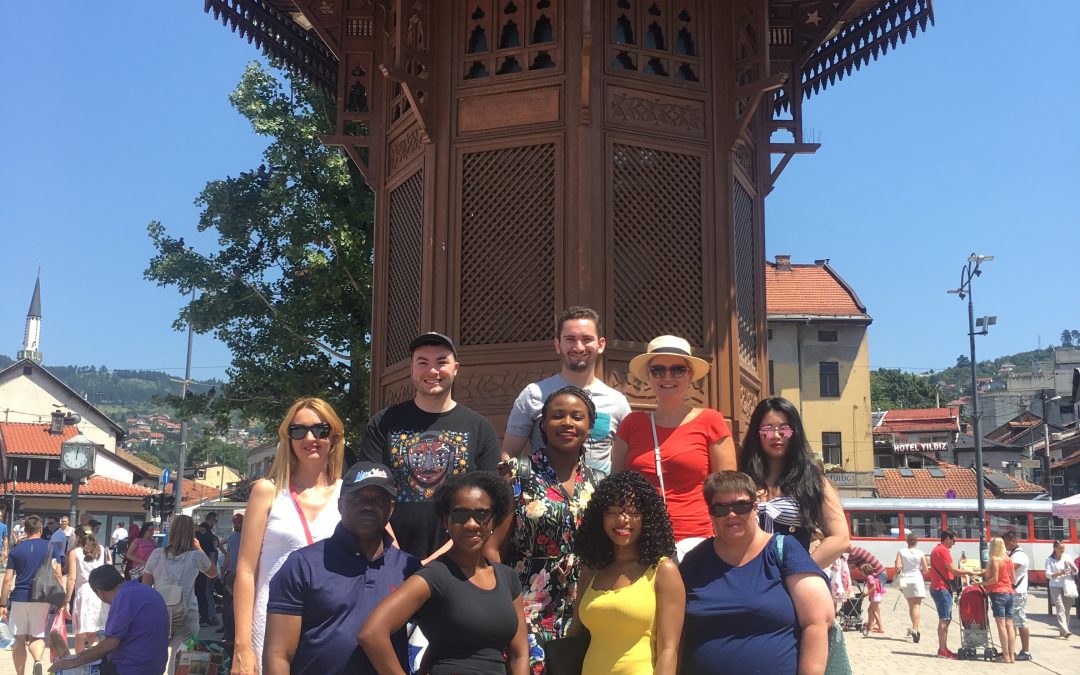
by Catherine Ruby | Sep 24, 2018 | Uncategorized
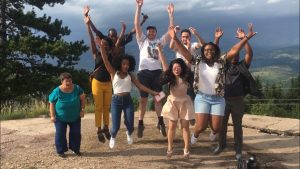
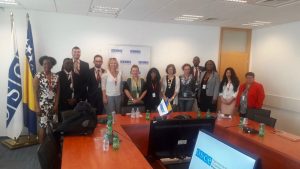 Author: Senhwa Horng, M.A. Candidate
Author: Senhwa Horng, M.A. Candidate
Sarajevo is a beautiful place. Beneath the rolling green hills, peppered with the red roof houses, stands the eclectic architecture of the storied and multi-cultured city. The old town sits quietly in the valley with its coppersmiths’ shops, cafes and ice cream stands, welcoming tourists with a quintessential languid, European charm. I visited Bosnia and Herzegovina in July, 2018 as part of a School of Diplomacy study seminar program led by Dr. Borislava Manojlovic to learn about peace and reconciliation in a post conflict nation.
During my short time there, I witnessed the beauty the country had to offer as well as the legacy of war that it carries on its shoulder. The people there are kind, gracious and generous in their hospitality. Yet, underneath the mask of tranquility, lies division. The war that tore the country apart in the 90’s left behind a bitterness and animosity that continues to hang over the three ethnic groups that make up the country’s population — they aren’t one Bosnian people, they are three distinct groups, the Bosniaks, the Serbs and the Croats. Time does not seem to have brought much healing.
Before our delegation departed the U.S., I was asked, “What interests you about Bosnia and Herzegovina? What do you hope to gain from your trip?” At the time, I couldn’t articulate well that what I wanted to see were the people who had lived through the realities of the war, the people for whom the terrors were neither fairytales nor simply the history of some distant land. In my sheltered and privileged life, I couldn’t understand war as more than an abstract concept. I wanted to learn about the Bosnian people’s experience and resilience. As I walked the streets alongside the locals who welcomed me into their shops and restaurants, I suddenly realized that the fields of international relations and conflict resolution are about people. As scholars, we cannot disassociate ourselves from the fields’ humanistic function of creating a safer world for people by understanding and preventing conflict.
As I reflect on my experience, there are three lessons that I know I will take with me, sometimes human nature collides with peace, hope and despair intertwine and peace belongs to those who fight for it.
Sometimes Human Nature Collides with Peace
Velma carried herself with the confident demeanor of a boss lady and her answers to our questions easily carried on into blusterous rants. She had a fierce passion, and from the moment I met her, I knew I liked her. My kind of girl, I thought. She knew what she stood for and she knew what she wanted to do, and she had a cause she was determined to fight for against all odds. The odds, it would seem, are stacked against her, and her fight proves to be a difficult one.
Velma is the founder and President of the Post-Conflict Research Center, an NGO that works to document stories of people during the war, stories such as those about heroic actions taken by ordinary people, stories about small actions that made a big difference.
“I also think storytelling is a powerful and intimate tool to help all sides see a conflict from the perspective of their enemies,” I said to her. In my naivety, there was a small part of me that thought, perhaps, the key to peace and reconciliation was right in front of me.
“It can be,” she replied, “Unfortunately, it’s not so easy to get people to listen to the stories of their enemies.” Velma explained, “We once tried to do a project that linked the stories of all three sides, side by side, and people were outraged. ‘You can’t tell the story of the Muslims, next to the story of the Serbs!’ they said.”
I thought to myself, Strange isn’t it? The opportunity to heal is right in front of them, and still there are people who would speak out against it. What could be more important than peace? What values are there in the world, so worth protecting, that would make a person choose to continue to hate their neighbor, over the opportunity to reconcile? It’s a stark contrast to see that in this world there are people like Velma who would fight for peace, and stand against division, and then there are people who would stand against peace, no matter the cost and no matter the reason. That’s what makes peace so complex, humans and all the multitudes of values, ideals, judgments and reasoning, both logical and illogical that come with being human.
Hope and Despair Intertwine
The Tunnel of Hope was a dangerous underground trek constructed during the Siege of Sarajevo in June of 1993. In the midst of war the tunnel was built by the Bosniak Army to create a passage through the Sarajevo Airport that would allow food, humanitarian aid, war supplies and weapons to be transferred into the city.
Today, this same tunnel, now called the Memorial Complex Tunnel D-B, is a museum, partially a tourist attraction, partially an educational resource. Our tour guide was a young woman who couldn’t have been much older than I am, but she had lived through the war, and through her stories and explanations an unfamiliar landscape came to life before my eyes. I could almost feel what it was like to spend a childhood in the backdrop of war.
“We didn’t have real eggs to eat during the war,” she said, “and my brother, who’s younger than me, he had never seen a banana until after the war ended. The first time he tried a banana he ate it with the skin still on.”
It seemed like a small detail beside the stories of violence that I had heard during in my time in the country, and yet the imagery of that seemingly trifling anecdote stuck in my mind, because to me, it was a picture of real life in a time of war.
Peace Belongs to Those Who Fight For It
The Genesis Project, an NGO working towards peace and unity in Bosnia and Herzegovina, shared the story of a school in a small town called Jajce. The regional government had made a decision to further divide the community along the ethnic lines that plagued it. The Bosniak and Croat students were separated into two different school buildings. But the children rose up and fought against the segregation. After a year of protest, their efforts were met with victory.
It was in that story that I learned that peace belongs to those who fight for it, and that the hope for peace can be found in unlikely places, in small towns and school children, and even in ourselves. Perhaps the responsibility of finding hope for peace, in places where it seems impossible, belongs to us all.
Senhwa Horng is a second year Graduate student from New Jersey, specializing in International Law and Human Rights as well as Post-Conflict State Reconstruction.
Save
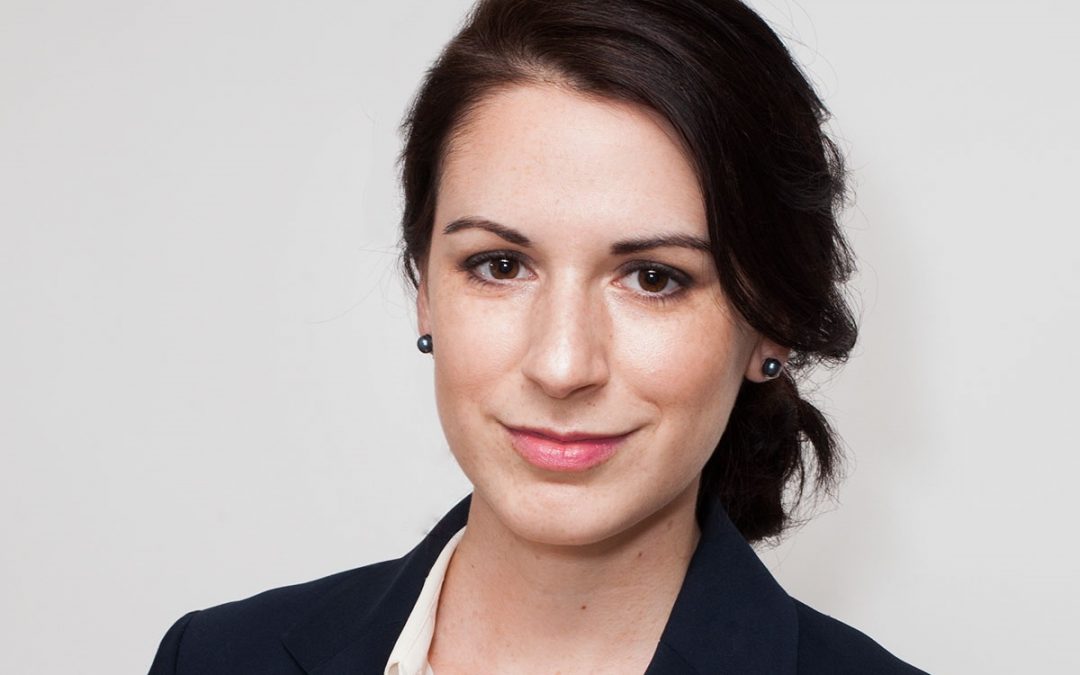
by Catherine Ruby | Jun 6, 2017 | Graduate Students, Internship Experiences
Emily Fox, M.A. May 2017
Carnegie Council on Ethics in International Affairs Internship
This spring, I had the opportunity to intern with the Carnegie Council on Ethics in International Affairs (EIA). I worked for Ethics & International Affairs, a journal publishing articles on current normative and ethical issues in foreign policy and international relations. One of my duties as an Editorial Intern was to act as the first point of assessment for all incoming submissions. In order to succeed at this task, I needed to have not only a strong theoretical background, but also a degree of familiarity with a wide array of current events. Thankfully, the School of Diplomacy has prepared me for these topics.
One of the most prominent debates in international relations ethics regards the policy and principle of the Responsibility to Protect, and many of the submissions I reviewed dealt with this topic. The knowledge I gained at the School’s United Nations Summer Intensive course was incredibly valuable for formulating assessments of these articles. Being able to hear firsthand from experts such as Hugh Dugan and Ed Luck really strengthened my background on the complexity of these issues and the opportunities and constraints the UN must navigate.
My skills in writing and editorial judgement were strengthened considerably by this internship, and I expanded my knowledge of international affairs by reading articles and essays by scholars. I learned a great deal about publishing and the peer-review process, and am able to participate and contribute in high-level meetings. Though I was lucky to have several years of professional experience prior to being hired at EIA, I have found that each professional environment teaches me something new about organization, communication, and workflow.
Should I choose to pursue a career as an editor, I will be prepared as my internship with EIA taught me a great deal about the requirements and challenges in the field, and has shown me the best practices for working through different stages of publication. As an intern, I often juggled several projects at once. My team at EIA was ready to provide guidance on prioritization and organization, which allowed me to complete my tasks efficiently without sacrificing quality.
The assignment I was most excited to complete at EIA was my book review. Each intern is invited to contribute a short review of a book of their choice for publication online and in the print journal. Because I could choose my book, I was able to pick something in an area in which I am interested. Not only was I able to read a book that interested me, but I also gained valuable writing experience from the exercise.
During my time at the internship, I tried to incorporate feedback whenever possible and volunteered for additional work when able. While I still have many opportunities for improvement, I think that applying these principles helped me to be successful thus far.
I would highly recommend my internship to others. The Carnegie Council is an excellent institution and a great place to be connected to. My coworkers have made me feel like a true member of the team, and their advice and guidance has been incredibly helpful for my professional development.
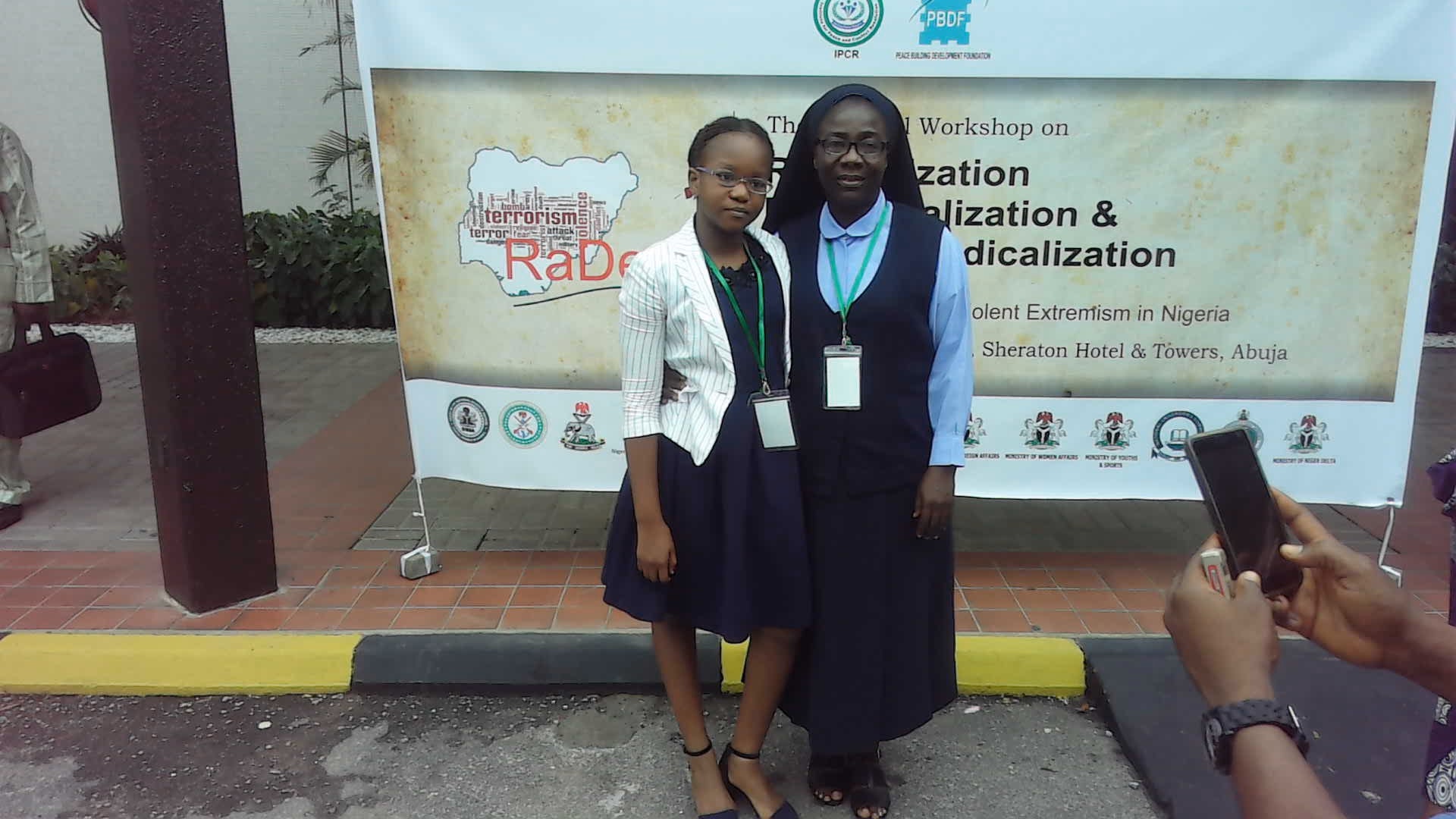
by Catherine Ruby | Nov 1, 2016 | Graduate Students, Internship Experiences
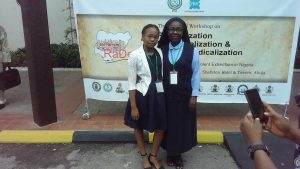
My name is Sister Mary John Bosco Ebere Amakwe and I am a graduate student at the School of Diplomacy and International Relations. I interned at The Institute for Peace and Conflict Resolution (IPCR) in Nigeria – at the Directorate of Internal Conflict Prevention and Resolution as a research assistant. This Institute was founded in 2000 under the Ministry of Foreign Affairs primarily as a research center, think-tank, and agency to strengthen Nigeria’s capacity for the promotion of peace and conflict prevention.
I chose to intern at this Institute because I was born and raised in Nigeria, a complex country where conflict is part of everyday life. I believe something has to be done because there is an urgent need for reconciliation and reconstruction of this great nation known as the “Giant of Africa.” and I want to be part of rebuilding efforts. Ultimately, I want to become a conflict mediator and my internship experience has absolutely solidified that passion to become one.
One of my very first assignments at the institute was to accompany a delegation which included the Director General of the Institute to the Embassy of Hungary that houses the United Nations High Commission for Refugee Agency (UNHCR) in Nigeria. The reason for the visit was to sign a Memorandum of Understanding (MoU) between the Institute and UNHCR. This signing is very important according to the UN Higher Commissioner for Nigeria and the Director General of IPCR because it is a way to formalize the partnership between the two bodies in their effort to further peace building efforts in Nigeria. UNHCR and IPCR also work together with different stakeholders in the country in revamping peace and taking preventive measures to stop conflict so that there will not be refugees and internally displaced people in the country. This is done by creating policy frameworks like personnel building, networking, and the implementation of all initiatives that will bring about conflict prevention and will lead to lasting peace in Nigeria. On July 11, 2016 there was another signing of a Memorandum of Understanding (MoU) between IPCR and Treasure Hunts – an NGO for peace and development in Nigeria which uses artwork, drama, plays, etc. for peace building. This experience fascinated me because it validated what I learned in the classroom and connected my course work as strategies for peacebuilding.
Finally, my internship offered me opportunities for networking. For instance, I had several conversations with Mrs. Paulette Dadey, the UN High Commissioner for Refugees in Nigeria; Mrs. Elizbeth Ekaete, the CEO of Emmanuel Royal Foundation for peacebuilding in families; Dr. Aliyu Ahmed-Hameed, principal consultant for Cardston Consulting Agency on peace research, policy and strategy; Dr. Marane Ngoulla, CEO of TOGUNA (the place of dialogue for peace) Foundation for peace and development. My last visit was with the Coordinator for the African First Ladies Peace Mission; and a member of the Nigerian House of Representatives. We discussed her role as a woman legislator representing her constituency in the House.
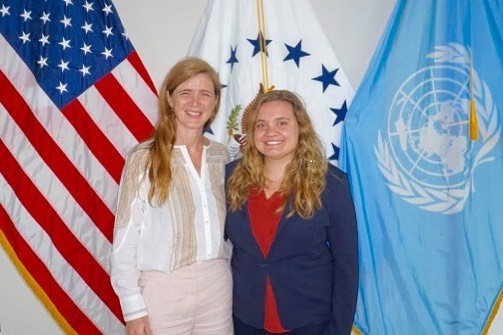
by Catherine Ruby | Sep 21, 2016 | Internship Experiences, Undergraduate Students
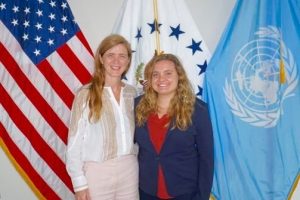
I interned for the U.S. State Department, Press and Public Diplomacy Office, at the U.S. Mission to the UN. This experience was a great one that not only taught me about work at the Department of State and the UN but also gave me my first insight into communications work, something I now consider a post-grad option that I never considered before.
Press interns at the US Mission have two main responsibilities including news monitoring and transcriptions. The Press Office is responsible for putting out verbatim transcriptions of U.S. ambassadors’ remarks at the UN and in other venues where they are operating in an official capacity. These remarks are released to the public and are government records, hence there is a high expectation of accuracy. Many reporters will ask the Press Office for transcripts of ambassadors’ remarks to include quotes in their articles. These reporters are often on deadline which increases the need for these transcripts to be done as quickly as possible. While our supervisors always checked our work before any transcripts were released, this task taught me a lot about how to work quickly under pressure while still maintaining a standard of excellence.
I also attended “brown bag lunches” that the Human Resources Department set up for the interns. We were able to have an hour long discussion with executives from different sections within the mission. This was an opportunity to learn from people doing work in all of the areas the U.S. Mission operates. We heard from many Foreign Service officers in the political and economic sections and what their responsibilities were in those areas. It was interesting to see how their work differed from the work of the Public Diplomacy officers that we worked with in press. My favorite part of these lunches was speaking with the economic officers as I am majoring in Economics as well as Diplomacy. One statement that stuck with me months later was from a discussion with an experienced economics officer who saw what she did as a form of ‘journalism’ for the government. These officers’ duties involve gathering information on the ground in whichever country they are stationed in and writing cables or “articles” that are then sent back to Washington. As someone who has always loved to write and even considered journalism as a career path, this was an eye opening conversation that showed me how I could combine all of my passions; economics, diplomacy, and writing; in a job with the U.S. State Department or another area of the federal government.
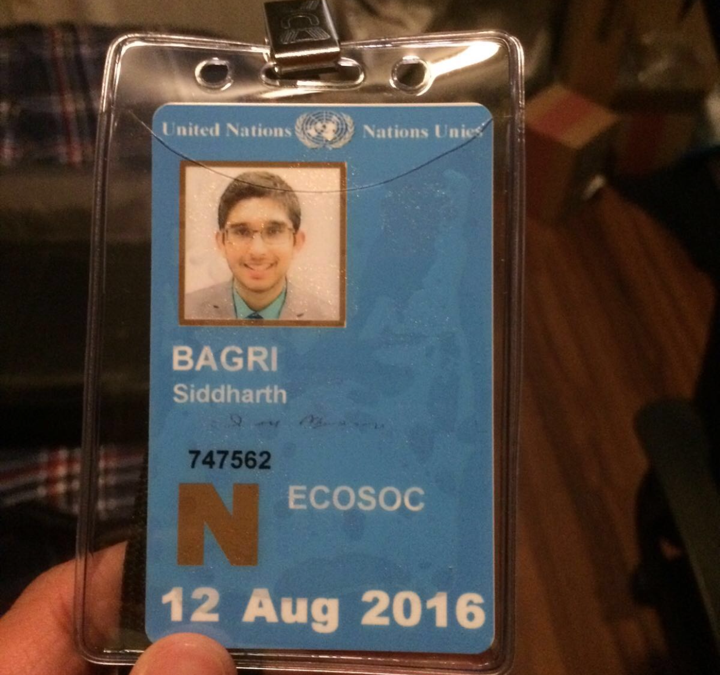
by Catherine Ruby | Aug 23, 2016 | Internship Experiences, Undergraduate Students
Working with Caritas Internationalis’ UN delegation with Mr. Joseph Donnelly gave me a close look inside the UN and on how NGO’s interact with the UN. Caritas is one of the world’s largest humanitarian organizations and much of my work involved researching and relaying information to my supervisor in order to help with his advocacy work. There was a focus on the current volatile situations in the 5 year old newest country, South Sudan, and the border regions of the country of Sudan itself. Sudanese forces have indiscriminately bombed civilians to the point where they have to retreat into caves in order to save themselves. Caritas is trying to provide aid to the people there but the government has also shown itself to be willing to bomb hospitals.
Caritas hosted the visit of a Sudanese Catholic bishop to advocate with UN agencies, Member States and NGOs about the sustained violence, intense human security and injustices taking place in South Kordofan, Nuba Mountains and Blue Nile regions. I scheduled meetings for the bishop. It was interesting to see how meetings are usually arranged in the UN system and I was surprised to learn how last minute some of them ended up being.
Organization is a key skill that I refined during this internship and I also sharpened my research skills. Towards the end of my internship I was asked to shift my focus to Latin America and the events going on there. I researched the current status of the historic peace process in Colombia between the government and the FARC after 50 years of fighting and a 2016 SC resolution/mechanism. This was an interesting experience, especially since I had to make sure that I filtered articles by date and made sure that my sources were reliable. This may sound like a straightforward and basic thing to do, but I realized that any mistakes that I made would have ramifications beyond me. This caused me to pay closer attention to small details.
I also learned to assess diplomatic language to a certain degree. I had the opportunity to attend meetings at the UN such as meetings in the ECOSOC chamber and the Security Council. Being able to hear how diplomats talk when they make speeches helped me navigate through the meanings beyond what was said. I am not exactly proficient at this, but it was a skill I previously did not have, and the more I refined it, the more interesting those meetings became.
My biggest takeaway from this internship would have to be a newfound appreciation for the UN and the various organizations that participate in the system. In the past, I was quite critical of the UN. I never thought that it should not exist, but I did think that the political dimension of it was a dead end that never seemed to work. The humanitarian work that the UN provided was the only thing it seemed to do better than anyone else, but since working at the UN I have come to realize that the UN is not a monolithic entity. Organizations like UNICEF are technically separate from the UN bureaucracy and so is the Security Council.
I realize now that the UN has taken the fall for many mistakes that originated from the member states, and that the UN is only as strong and as effective as the member states want to be. Politics certainly gets in the way of many of the initiatives that the UN tries to undertake, but the UN is still able to function despite the obstacles. I had never really considered the UN as a possible career path, but now that I have completed my internship there, I would not mind searching for a job there.
I would definitely recommend this internship to others. Perhaps they will walk away with a greater appreciation for the UN, as I did.
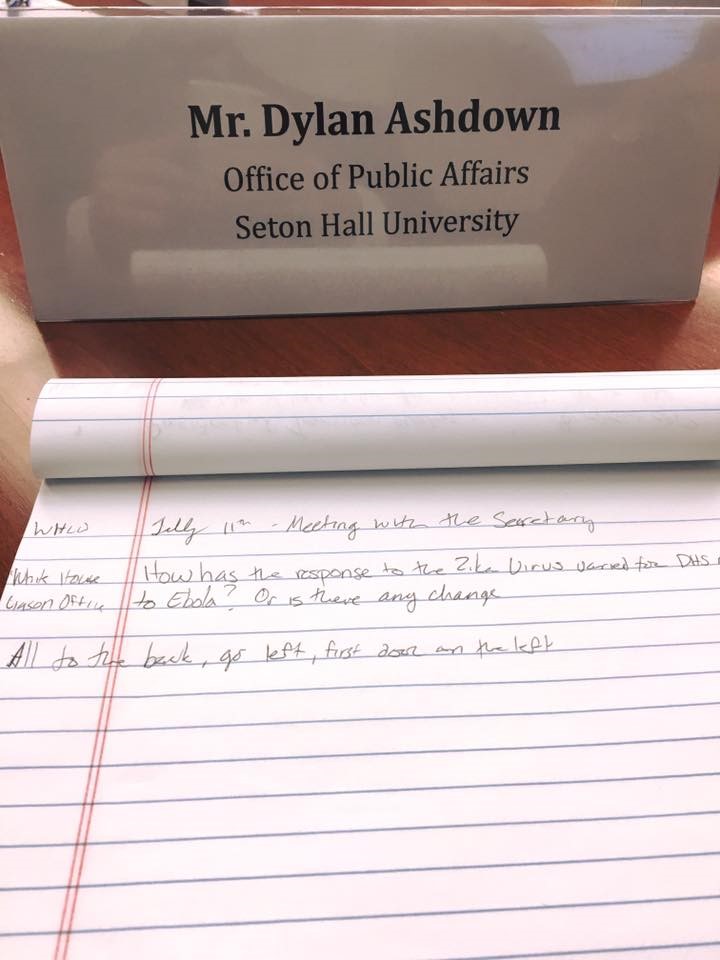
by Catherine Ruby | Aug 18, 2016 | Graduate Students, Internship Experiences
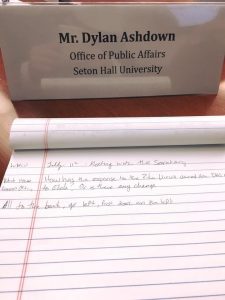
Finding a Home at Homeland Security
Hello, my name is Dylan Ashdown and I am currently a Public Affairs intern in the Office of Multimedia, Motion Pictures, and Television, Office of Public Affairs, Department of Homeland Security (DHS). At Seton Hall, I am finishing up two Master’s degrees which will be awarded to me at the end of my internship; one degree will be in Diplomacy and International Relations and the other is in Strategic Communication. This internship has been very beneficial and I highly recommend it to anyone who is interested!
I have the “cool” internship. I work directly with the writers and producers of documentaries, television shows, and feature films, along with other “non-news” media stakeholders. Both of my degrees have been of use in this internship. The other day a writer reached out to our office requesting DHS’s help with their show. I ended up spending a few hours researching where I would defect if I was a scientist escaping from an evil government in New York City for a script the writer was working on. This was something that was very relevant to my Diplomacy schooling. In terms of my Strategic Communication classes, I have put together pitch plans for movie producers and interviewed cybersecurity professionals, and technology experts/inventors (all of whom one can find in the Homeland Security).
There is always something exciting happening at DHS. For example, today I attended the daily morning briefing and found out that I was meeting the Secretary of Homeland Security in three hours. Three hour later, I am sitting in a room with 15 other interns getting a briefing directly from the Secretary. This is not your normal internship experience!
Ultimately, the best thing about my internship hasn’t been meeting politically famous people; the best part has been the mentorship that I have received from my supervisor. I never really understood the meaning of a mentor until I started this internship. I asked more questions in my month here at DHS than I ever did in my six years of school and my mentor has gone out of his way to answer all of them. I have learned how to walk, talk, and behave as a public affairs professional in Washington D.C. because of the hours that I have spent with my mentor and because of how much he trusts me to handle projects on my own.
The most rewarding part of my internship is knowing that my work has a direct impact on educating the American people on the work of the Department of Homeland Security. I am very happy that I chose to intern at the Department of Homeland Security, Office of Public Affairs.
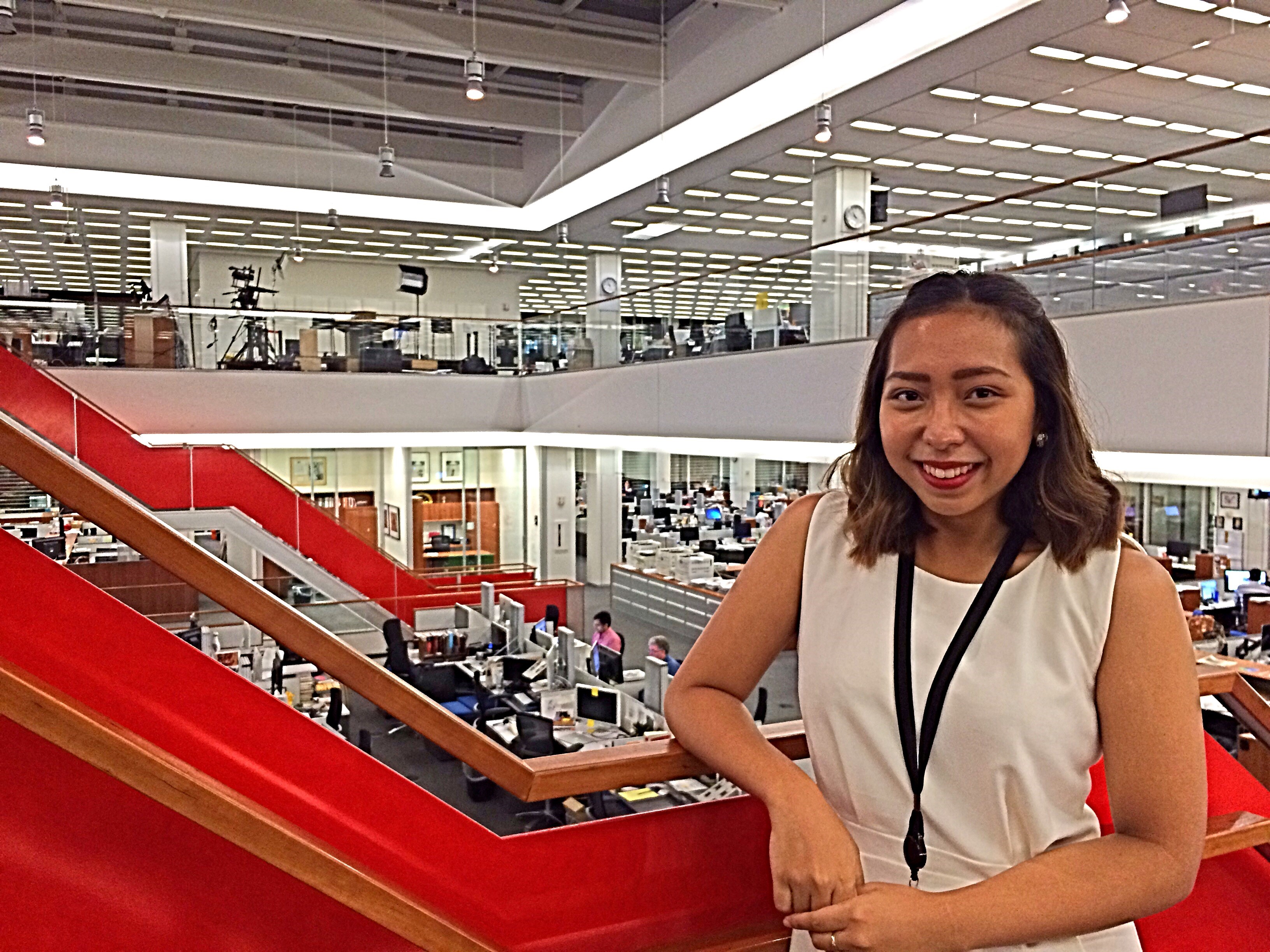
by Catherine Ruby | Aug 18, 2016 | Internship Experiences, Undergraduate Students
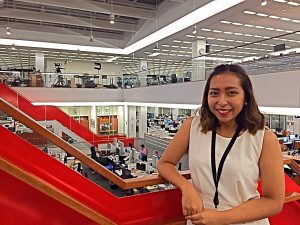
After Deadline – My Summer at The New York Times
I started my internship at The New York Times on the day of the Orlando attacks, the worst mass shooting in United States history.
Or maybe this thrilling summer began in May, when I spent a week at Temple University with 12 other lucky souls in what was, basically, editing boot camp – seven days that began with a wakeup call at 6 a.m. and ended after falling asleep on my books well past 1 a.m.
Let’s go even further and say the adventure started in December, two weeks before finals, when I got a phone call from a kindly old man who told me out of the blue that he would see me in Philadelphia. Confused, I asked, “Excuse me, what is this for?” And Professor Edward Trayes said, “Oh, The New York Times is looking to pay you $1000 a week to be an editing intern – does that sound good?”*
But this story really kicked off when I spent the entire month of October reviewing for the Dow Jones News Fund copy editing test – a tear-inducing, confidence-busting exam that around 1000 applicants subject themselves to every year, just for a shot at the world’s greatest bastion of journalism.
I thought I’d flunked the test, which made the call from Dr. Trayes all the more surprising. At that point, I would have been happy to be assigned to any desk at the Times, but Dr. Trayes thought I would be a good fit for the Foreign/National desk – or, paradise for an international relations major observing her first U.S. election.
Foreign/National was inundated by so much bad news this summer (multiple bombings, multiple shootings, multiple email scandals from the Democrats, multiple gaffes from Donald Trump) that one of the staff editors, a former Dow Jones intern, said, “Francesca, this is the no-joke desk. You should be proud of yourself for surviving this summer.”
Honestly, I’m just relieved I survived the hours: I worked on Saturdays from 9:30 a.m. to 4:30 p.m., then on Sundays to Wednesdays from 4 p.m. to 11 p.m.
A lot of things copy editors do are easier said than done – for example, writing a headline that is punchy and attention-grabbing and an accurate summary of the story while staying true to the lofty Timesian tone and fitting into the allotted layout perfectly is an art form.
The challenge for us interns was to make it on “After Deadline” – a weekly list on the Times’s internal blog that recognizes the past week’s best headlines. Only one out of nine ever made it (spoiler alert: it wasn’t me). Getting my first headline through to print had been hard enough, but it finally happened on a story about Hillary Clinton and Elizabeth Warren. My proudest achievement, though, was on the first night on the Democratic convention: I wrote the headline for a story about Michelle Obama’s relationship with Hillary Clinton, and for a few hours that night, it was the first hit on Google if you searched “Michelle Obama.”
There are many things that people don’t realize about newspapers. The locations you see at the top of the article? Those are called datelines, and they indicate that the reporter was actually on the ground. But that doesn’t mean real journalism is putting on a helmet and running around a war zone with a GoPro. Some budding news websites like to put reporters in the center of the story, producing content such as “Here’s What Happened When I Had Dinner with a Taliban Leader,” or something like that. The New York Times is the only legacy newspaper that still maintains an extensive international staff in bureaus throughout the world, and reporters are assigned to a region for extended periods, not just for one-day trips.
The highlight of my internship with the New York Times was when I met Azam Ahmed, the bureau chief formerly in Kabul and now in Mexico City. I was excited not only because he was a foreign correspondent, but also because he had written the article on Taliban justice that inspired my thesis. Talking to him made me want to be a foreign correspondent all the more. You could read every academic paper about Afghanistan, but an ivory tower academic will never be able to tell you about Afghanistan the way a journalist on the ground can.
Of course, it’s going to be a while before I’m anywhere close to being worthy of Azam’s credentials.
But this summer at The New York Times was an important stepping stone, and I am grateful to have experienced how a world-renowned newsroom with the highest standards works. Now it falls on me to build my street cred as a journalist and, hopefully, work my way back to the august institution on Eighth Avenue.
*I kid you not – this was how the conversation actually went.
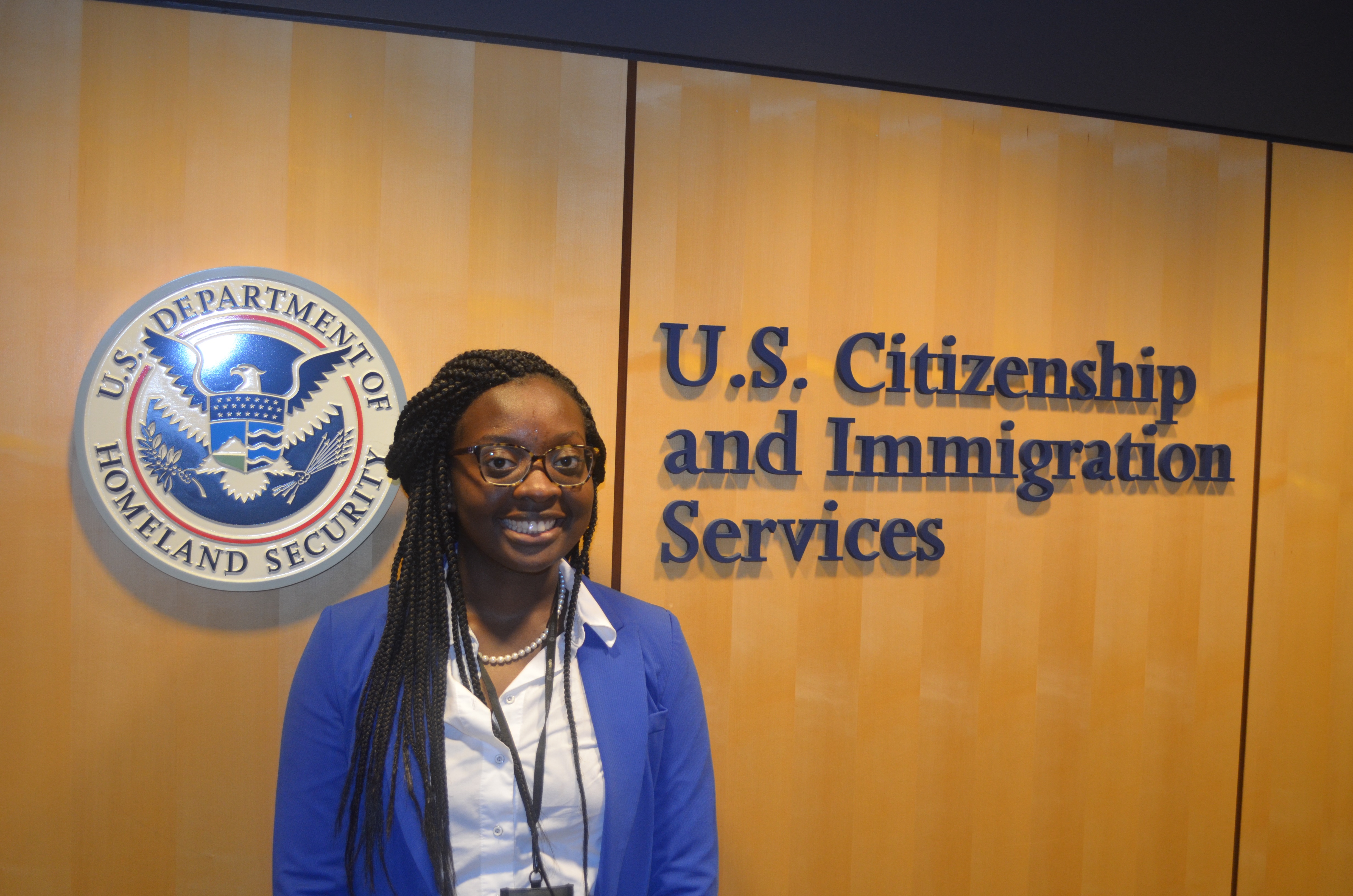
by Catherine Ruby | Aug 18, 2016 | Graduate Students, Internship Experiences
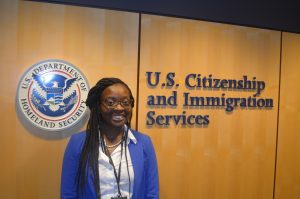
I am Nina Robinson, a dual degree candidate of the M.A. programs in Diplomacy and Asian Studies. I interned with the Department of Homeland Security: United States Citizenship and Immigration Services (USCIS), specifically with the Office of Privacy. My long-term goal is to become a Foreign Service Officer and to one day serve as a Career Ambassador. Since high school, after studying in China for two consecutive summers, I knew that I wanted to dedicate my life to a career in Diplomacy.
Essentially, my desire to hone my skills and apply the knowledge that I learned in my Diplomacy classes; gain Federal Government experience; and to prepare for a career serving the United States, is what led me to pursue an internship with DHS-USCIS. The Department of Homeland Security was created after the September 11, 2001 terrorist attacks, to safeguard the United States’ border. The agency’s mission is to protect all people, including U.S. citizens, permanent legal residents, immigrants, and non-U.S. citizens. The Department of Homeland Security has offices almost all over the world, which assists those who wish to become citizens and seek asylum due to fear of persecution or danger.
Working with the Department of Homeland Security- United States Citizenship and Immigration Services, introduced me to the many avenues that one may take to establish a federal career focused on international relations. The Office of Privacy, although a small office and often confused with civil liberties or security, plays an important role in the agency. USCIS works to ensure that citizens around the world have the opportunity to become U.S. citizens and provides benefits and services for immigrants. The Office of Privacy works to ensure that the work conducted in USCIS promotes transparency in the government and protects its clients who include non-U.S. citizens and immigrants. The Privacy Act of 1974, which was enacted after the Watergate scandal with then-President Richard Nixon, is the cornerstone of my office. This Act is what helps the Office of Privacy guarantee that information being collected from the people by the government is being protected. Our office ensures that immigrants’ and citizens’ personal information, provided to the Department of Homeland Security and the United States Citizenship and Immigration Services, is being protected, which includes informing clients of what their information is being used for and how it will be used.
In the short period of time I interned here, I have learned a tremendous amount. I have attended four trainings, all which are exclusive to the analysts and officers in the Office of Privacy. As not to go too far into specifics, I have learned about the importance of encrypting PII (Personal Identifiable Information) and various information sharing database sources that the United States and other partner countries use to identify suspected terrorists. Along with training, my office has also provided mentorship, helping me to familiarize myself with various Privacy Act Laws as it relates to the Federal Government and offering career related advice. My life-long dream of becoming an ambassador has not changed. However, Privacy has become a big issue in the world of International Affairs and is a growing field. Students who are looking to put their diplomacy and analytical skills to use may find Privacy an interesting and exciting alternative to the Diplomacy field.

 Author: Senhwa Horng, M.A. Candidate
Author: Senhwa Horng, M.A. Candidate












